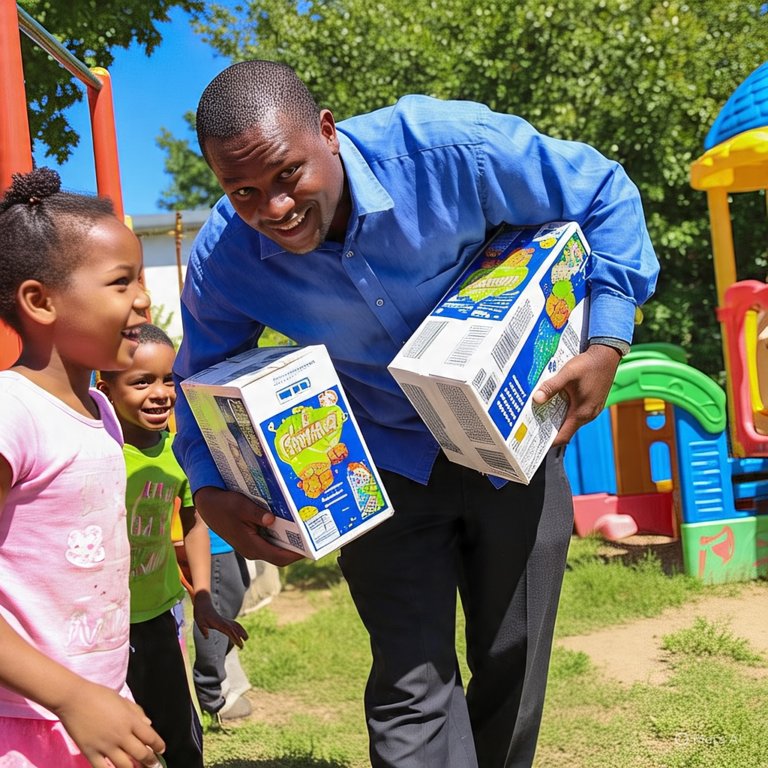Weak Excuse.
 Image generated using Meta AI
Image generated using Meta AI
We often think weakness hides behind excuses. Sometimes, it hides behind silence, behind the mask of fear of disappointing others, behind laziness, or avoidance, without owning the truth. We've all heard them—those flimsy justification offered in the face of unmet responsibilities. "I was too tired," "I forgot," "something came up,"—apparently, these weak excuses seem harmless, even relatable. But beneath them lies a pattern that, if unchecked, might erode trust, accountability, and personal growth.
Stanley had used weak excuses as a shield. I usually assumed he was just simply unlucky—always missing deadlines, forgetting meetings, or even showing up late with a new excuse. But over time, i realized it wasn't bad luck; it was a habit.
The first time I actually heard Stanley say, "I could not make it because I was tired," I actually believed him.
It was a humid Thursday morning in Surulere. The sun, though hidden behind grey clouds, cast a heavy stillness on the streets. We had plans; Stanley and I had mapped out a strategic plan to visit the rehabilitation centre that day—an initiative we had both volunteered for after the life-changing youth conference in Yaba two months earlier. We were fresh out of the university, hungry and determined to make a difference, and buzzing with plans.
The centre sat quietly on the outskirts of Yaba, nestled in a sunbaked compound where faded murals whispered tales of resilience. The walls, once bright, now bore the stains of years gone by. Inside, children with wise eyes and cautious smiles—who had seen too much for their age—welcomed us. We came bearing books, shoes, snacks—and most especially, our time.
Eventually, Stanley missed that day. And the next.
I actually brushed it off at first. After all, everyone has off days every now and then, and Stanley had always been a little... inconsistent. Charming, intelligent, and capable of commanding a room with his deep voice and confident posture; however, when it came to follow-through, he actually flinched every time.
The next time he gave a weak excuse, we were supposed to present our already mapped out plan to the NGO board. He assured me he was going to handle the PowerPoint and I would handle the speech. On the morning of the presentation, I actually called him five times. He eventually picked on the sixth ring, groggy.
"Ah, Happy, I don't think I can make it again, o. I didn't sleep well last night. My head is pounding. Please let's reschedule." he said apathetically.
I sank into my stomach, and I could not help but feel really abandoned. "We can't possibly reschedule, Stanley!" I exclaimed furiously.
When I confronted him a week later, while he was in the art studio, he shrugged.
"It's not like they'll die if we come next week instead," he said with a nonchalant attitude.
 Image generated using Meta AI
Image generated using Meta AI
His words chilled me more than the air conditioner in the art studio, which had been our casual hangout spot since university. The creative, calm space in the art studio makes expressions natural and safe.
"You don't get it, do you?" I said, keeping my voice even. "They waited for us. Hoped for us. Made room for us. Prepared for us. And every time we don't show up, we keep telling them that they don't matter." I said calmly but bluntly.
Stanley just stood there, dumbfounded, staring at me as if I'd grown another head. "Ah ah na! It's not that deep, o; you are just overreacting," He exclaimed, smirking.
That was the first time I walked away from him.
But actually, not the last.
The breaking point came just few months later. We'd manage to organize a charity football match to raise funds for a new learning center in Iba New Site. Stanley was in charge of the venue. I trusted him—perhaps too much.
The day arrived. Children arrived. Volunteers arrived. Our chartered bus and its driver had arrived. But the venue's gate remained shut.
Stanley didn't show up.
I paced around, frustrated, called Stanley several times, but there was no response. Then I sent a series of messages, which I was sure he saw and ignored. I prayed silently while pacing around, and then finally, he sent a voice note. His voice was casual as if we were discussing the weather. "Hey... something came up. My cousins had a naming ceremony. I could not get away. Hope is not too late to reschedule? Thanks." he said sounding relaxed.
"Reschedule again?!" I yelled out in anger.
I sank into the chair inside an empty apartment provided by a 'good Samaritan woman', so to speak, who saw our frustrations and showed us kindness. At this point, I felt exhausted—not from the day's heat, but from disappointment. A few of the children looked at me, sensing my frustration. One boy, named Kelechi, came forward and offered me a bottle of water
That little act—that little boy comforting me—was my turning point.
 Image generated using Meta AI
Image generated using Meta AI
Weeks passed. Stanley texted and called. I deliberately didn't respond or replied.
One calm Saturday afternoon, while I was still busy with my laundry, Stanley showed up at my gate, holding a multicolored nylon bag and the same old grin.
"Shawarma and juice?" he offered, raising the irresistible nylon to my face. "Your favorite," he continued, grinning but this time, raising his brows with a hopeful look.
"I don't want it!" I exclaimed, faking a frown.
"You always have a reason, Stanley. A weak excuse."
His face dropped. "Life happens, Happy," he simply said.
"No," I said, crossing my arms. "Life doesn't just happen. You let it happen. You choose not to show up. It was your choice; it's all you, not life," I bluntly said.
He looked away, scuffed his sneakers on the concrete, then turned his gaze back to me and said, "You think I don't care. But I do. I just... I get overwhelmed. I hate letting people down. So I disappear." he said sadly, now looking downwards.
I studied him. For the first time, Stanley looked like a little boy caught in a terrible storm, not the confident man he pretended to be.
"Then be honest," I said gently. "You actually need to stop hiding behind excuses. Just say you're scared, or unsure. I can and will handle the truth and deal with it as it is. But definitely not lies. lying will only make things worse." I smirked and collected the irresistible sharwama from him.
That was the first honest conversation we had in years.
Stanley didn't change overnight but he made effort.
He showed up to the next outreach—late, but with cartons of notebooks, refreshments and a sweaty brow from rushing. He joined the planning meetings, asked questions, and stayed quiet when he was tempted to defend himself. He even apologized to the children, explaining that adults, too, sometimes make mistakes.
 Image generated using Meta AI
Image generated using Meta AI
And from there, a new kind of strength grew.
The kind that had no weak excuses
THANKS A LOT FOR READING ME
f
Powerful post to read, thanks for sharing ❤️
hi my friend @nayhalie-s. Thanks for stopping by.🥰
most people are just like this. they would have made it a habit always to give weak excuses.
exactly. Thanks alot for stopping by.🥰
Thank you.
You said something striking.
“Life doesn't just happen, you let it happen.”
And just like you showed us, excuses don't make things happen, they rather slow down or inhibit growth. It's great to see Stanley coming off the hook of excuses.
Great content.
Sure, our choices matters. Thanks for stopping by.🥰
Indeed, life doesn't just happen, we're responsible for what happens to us...great writing 👍
That's true. And thanks for stopping by.🥰